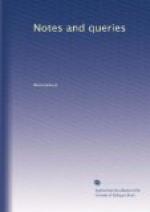The verses I now send you, and which may, perhaps, be worth preserving in your valuable miscellany, originated thus:—On occasion of a social meeting at Brownhill inn, in the parish of Closeburn, near Dumfries, which was, according to Alan Cunningham, “a favourite resting-place of Burns,” the poet, who was one of the party, was not a little delighted by the unexpected appearance of his friend William Stewart. He seized a tumbler, and in the fulness of his heart, wrote the following lines on it with a diamond. The tumbler is carefully preserved, and was shown some years since by a relative of Mr. Stewart, at his cottage at Closeburn, to Colonel Fergusson, who transcribed the lines, and gave them to me with the assurance that they had never been printed.
The first verse is an adaptation of a well known Jacobite lyric.
“You’re welcome Willie Stewart!
You’re welcome Willie
Stewart!
There’s no a flower that blooms
in May
That’s half so welcome
as thou art!
Come bumper high, express your joy!
The bowl—ye maun
renew it—
The tappit-hen—gae fetch
her ben,
To welcome Willie Stewart!
May faes be strong—may friends
be slack—
May he ilk action rue it—
May woman on him turn her back
Wad wrang thee Willie Stewart!”
J. Reynell Wreford.
* * * * *
LACEDAEMONIAN BLACK BROTH.
Your correspondent “R.O.” having inquired after the author of the conjecture that the Lacedaemonian Black Broth was composed wholly, or in part, of coffee, such an idea appearing to me to have arisen principally from a presumed identity of colour between the two, and to have no foundation in fact, I have endeavoured to combat it, in the first instance by raising the question, whether it was black or not?
This has brought us to the main point, what the [Greek: zomos melas] really was. And here “R.O.” appears to rest content upon the probablity of coffee having been an ingredient. Permit me to assign some additional reasons for entertaining a different opinion.
We read nothing in native writers of anything like coffee in Greece, indigenous or imported; and how in the world was it to get into Laconia, inhabited, as it is well known to have been, by a race of men the least prone of any to change their customs, and the least accessible to strangers. Lycurgus, we are told, forbade his people to be sailors, or to contend at sea[6], so that they had no means of importing it themselves; and what foreign merchant would sell it to them, who had only iron money to pay withal, and dealt, moreover, as much as possible by way of barter?[7]




